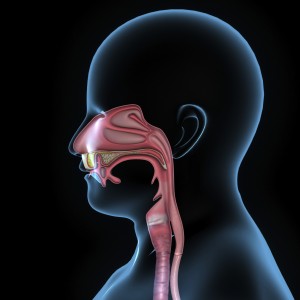
There are many different reasons people suffer from a chronic stuffy nose, identifying what is causing your stuffy nose will help bring about appropriate solutions.
What Causes A Stuffy Nose?
The most common cause of a stuffy nose is inflammation of nasal turbinates. The nasal turbinates are located on the inside walls of your nasal cavity, these small bones resemble a shelf and are covered in mucous membranes. The jobs of the nasal turbinate are to warm, humidify and clean the air you inhale before sending it to the lungs. As the turbinates work they naturally change shape and size, but if they become enlarged for some reason nasal blockage occurs and normal breathing becomes impaired.
Many different things can lead to chronic enlarged turbinates including:
- With age turbinates naturally thicken causing nasal airways to narrow
- Exposure to certain allergies or infections
- Exposure to a certain irritant such as weather, stress, certain medications, hormone fluctuations, and a number of other things.
Rhinitis: Inflammation Of The Nasal Cavity
Chronic turbinate inflammation and nasal obstruction are most often linked with rhinitis. Rhinitis causes the mucous membranes that line the nasal cavity to inflame, sparking the surrounding blood vessels to subsequently swell. As a result, the turbinates enlarge and airflow through the nose becomes obstructed. Rhinitis is fairly common, as one out of every five people is impacted by allergic rhinitis.
Nonallergic Vs. Allergic Rhinitis
Rhinitis is often caused by allergies, although it doesn’t have to be. If you suffer from allergic rhinitis your body is reacting to a certain substance it deems threatening. When you breathe in something your body classifies as an allergen, your body responds in order to fight off the invader by releasing histamine. This histamine is what causes inflammation, and sparks your stuffy nose. Allergies differ from person to person, but common allergens known to provoke rhinitis include pet dander, mold, smoke, certain household odors, artificial fragrances, and poor air quality.
Nonallergic rhinitis is very similar, although it is not caused by a particular allergen and it is also less common. Nonallergic rhinitis can be difficult to diagnose since a certain allergen cannot be identified. In some cases structural problems are to blame, for example a tumor or narrowed nasal cavity.
What Are The Symptoms of Rhinitis?
Some people only experience a stuffy nose, but there are other symptoms that accompany rhinitis, including:
- Congestion
- Sore/scratchy throat
- Watery and itchy eyes and/or nose
- Persistent cough
- Post-nasal drip
- Headache or pain in face
- Loss of smell, hearing, or taste
- Fatigue
Diagnosing And Treating A Chronic Stuffy Nose
Diagnosing the cause of your stuffy nose is as simple as undergoing a physical exam from your doctor. The cause of your rhinitis will help determine the best way to get your full range of smell back. If you are suffering from allergic rhinitis an allergy test can be conducted in order to pinpoint what you are allergic to. Once you know the trigger of your stuffy nose you can work to avoid that irritant, which should in turn relieve you of congestion.
Generally, allergic rhinitis will clear up on its own once the irritant is removed from your environment. Nonallergic rhinitis may last longer but if the cause is pinpointed treatment can help manage symptoms.
Treatment options for allergic rhinitis include:
- The best way to treat allergic rhinitis is to avoid your trigger allergen(s). If the allergens are present in your home they need to be removed. If your allergic to pollen or any other outdoor allergen, you don’t have to become a recluse but you should avoid going outside during peak times as much as possible.
- If avoiding the allergen is not an option there are steroid sprays, nasal sprays, decongestants, and antihistamine pills available to help reduce symptoms.
- Allergy shots and medication prescribed by your doctor may also help
Treatment options for nonallergic rhinitis include:
- Nasal sprays that contain corticosteroids or antihistamines may be used
- Nasal sprays and other forms of decongestants can relieve symptoms
- If structural problems are to blame surgery may be a viable option
Talking with a doctor will help you find the best solution for your chronic stuffy nose.
If your nose is always stuffy visit Urgent Medical Center today for answers and relief.




